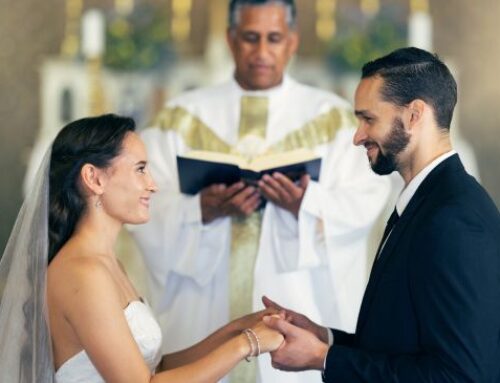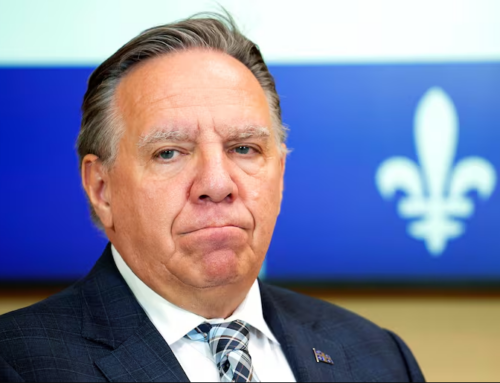Two new Anglican structures commissioned
 In the wake of their national church declaring homosexual relations holy, 700 biblically orthodox Anglicans have met in Ottawa to form two new organizations: the Anglican Federation and the Anglican Network.
In the wake of their national church declaring homosexual relations holy, 700 biblically orthodox Anglicans have met in Ottawa to form two new organizations: the Anglican Federation and the Anglican Network.
The two structures were commissioned during The Way Forward, a national conference Aug. 30-Sept. 1 sponsored by Essentials, a coalition of evangelical, charismatic and prayer book Anglicans.
The Federation and Network will enable orthodox bishops to offer pastoral care to orthodox individuals and congregations isolated in liberal dioceses. Although several foreign bishops have offered such oversight, this is seen as a more practical, Canadian solution.
Traditionally, an Anglican bishop can only minister in a fellow bishop’s diocese with his permission. The Federation will operate where a liberal diocesan bishop gives permission to an orthodox bishop to offer episcopal oversight to orthodox congregations and individuals.
The Network will operate in those dioceses where a liberal bishop does not give his permission. The Network is for those congregations and individuals who perceive themselves to be in impaired communion with their diocesan bishop.
“The conference did not create a new denomination,” said Charlie Masters, national director of the Essentials Council. “It is the Anglican Church of Canada that has moved away from historic Anglicanism and created something new. The Federation and Network are claiming ground the revisionists have deserted. We are establishing ourselves within historic Anglicanism. We have not moved. They have.”
 The first likely to join the Network will be those Vancouver-area congregations currently associated with the Anglican Communion in New Westminster (ACiNW), who have declared themselves to be in impaired communion with their bishop, Michael Ingham, since he authorized the blessing of same-sex unions. Notably, almost 100 British Columbians attended the conference.
The first likely to join the Network will be those Vancouver-area congregations currently associated with the Anglican Communion in New Westminster (ACiNW), who have declared themselves to be in impaired communion with their bishop, Michael Ingham, since he authorized the blessing of same-sex unions. Notably, almost 100 British Columbians attended the conference.
Essentials organizers hope that persons and congregations can easily migrate between the two groups as their consciences lead and as circumstances dictate.
All conference participants, observers and media, were require to sign a statement that they not only affirmed orthodox Christianity as expressed in the Montreal Declaration, but also repudiated the controversial motion passed by General Synod in May “affirming the integrity and sanctity of committed, adult same-sex relationships.” The statement declared that the governing body had “erred grievously” and would “imperil our relationship with the worldwide Anglican Communion.” The signing requirement even applied to journalists – the Anglican Journal and the Ottawa Citizen refused to sign the statement and did not cover the conference.
Conferees voted unanimously for an interim steering committee for a Federation of “all Canadian Anglicans committed to the recovery and renewal of the orthodox heritage” of Anglicanism.
Four bishops representing the four ecclesiastical provinces will sit on the Federation Council: Bill Anderson (B.C. and Yukon), Andrew Atatgotaaluk (Rupert’s Land), Peter Mason (Ontario) and Bill Hockin (Canada). Bishops Larry Robertson, Tony Burton, Ron Ferris and Len Whitten will serve as alternatives.
About one-third of the conferees showed further interest in the Network. It hopes to provide “adequate episcopal oversight for traditional Anglicans who find themselves, either now or in the future, caught in situations of impaired or broken communion” with their bishops or the national denomination.
The high numbers of those wanting to associate with the Network took organizers aback and larger rooms had to be found. “I no longer feel alone,” said Andy Leroux, a priest at St. Ninian, Toronto, who attended the Network meeting. “I’m encouraged by this unified front.”
The steering committees of both groups were commissioned during a communion service presided over by Donald Harvey, bishop of Newfoundland. Harvey will give episcopal oversight to the Network when he retires in December. Robert Duncan, the bishop of Pittsburgh, blessed the Network’s committee. Duncan is the moderator of the Anglican Communion Network in the United States, a parallel organization.
Vancouver lawyers Cheryl Chang and Joyce Lee said a legal network was being set up to assist clergy and parishes who may find themselves in licence and property disputes with their diocese. Financial adviser Larry Winslow was emphatic that, “No one has to lose their pension.”
But it was the ministry of a dozen former and celibate gay and lesbian Anglicans that was most moving. A workshop on pastoring Christians with same-sex attractions was crammed with 125 participants. Dozens had to be turned away. Later, a plenary session heard the testimonies of three former homosexuals: Daryl Duke, Rev. Don Alcock and Rev. Dawn McDonald.
McDonald’s story was particularly heartbreaking. She had been raped by both her grandfather and her uncle and rejected by her father, a missionary in Japan. Afraid of men, she sought comfort for 13 years in a lesbian relationship. Today, she claims to be free from same-sex attractions, and is a married priest at Holy Cross Japanese congregation in Vancouver.
Archbishop Gregory Venables, the primate of South America, William Murdoch, a bishop from Maine, and Wallace Benn, an English bishop, brought words of encouragement and were among 13 bishops celebrating the closing Eucharist.
The conference was also mission-oriented. One offering was dedicated to the African churches that no longer accept funds from the Episcopal church of the USA.
According to The Anglican Church Directory, between 1994 and 2000, the Anglican Church of Canada lost 92,925 members from its parish rolls, or an average of 15,487 members per year – over 1,000 per month. In 2000, there were 650,977 members on the parish rolls. It is feared that more will leave in the wake of General Synod’s declaring homosexual relationships holy and as rites for same-sex unions are authorized. The Essentials Council hopes the Federation and the Network will provide ways for orthodox Anglicans to remain within the global Anglican Communion without compromising their beliefs.
Masters said, “Orthodox Anglicans in Canada have laid the groundwork for a highway that will allow God to lead us all forward in our quest for a truly faithful and restored Anglicanism in Canada in full agreement and fellowship with the worldwide Anglican Communion.”




